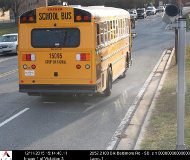3/6/2018
Maryland House Passes Minor Speed Camera ReformMaryland motorists could challenge red light camera tickets issued at intersections with illegally short yellows under proposed law.

Members of Maryland's House of Delegates have proposed sweeping reforms for the state's troubled speed camera programs this session. Last week, lawmakers chose to advance only the most minor of adjustment to existing practices. The House on Thursday gave a unanimous nod to House Bill 204, a measure that in its original form would have mandated yellow times last a minimum of 4 seconds at intersections with red light cameras.
"Under the bill, the minimum must be set at four seconds," the official legislative analysis for HB204 explained. "Potentially, then, the duration of some yellow lights could increase by as much as one second. Accordingly, the number of violations captured by red light cameras at those intersections may decrease significantly and result in fewer citations."
Under heavy pressure from jurisdictions that would lose revenue from longer yellows, delegates deleted the 4 second requirement. The remaining legislation, as passed by the House, states that a red light camera ticket can only be enforced if the yellow signal duration is consistent with state regulations. If passed by the state Senate and signed by the governor, motorists would then be permitted to challenge photo tickets at locations with overly short yellows.
Motorists have not had this power before. As the Maryland Drivers Alliance noted in testimony before the House Transportation Committee last week, Maryland courts will not even allow mathematical evidence demonstrating errors in a speed camera's reading. Jurisdictions need only point to a self-calibration printout from the camera to establish guilt in court. For example, Rockville's speed camera falsely accused a school bus of traveling 54 MPH in a 25 MPH zone -- a speed impossible in the circumstances on the road in question.
"All of the documents for this violation were in order," the Maryland Drivers Alliance's Ron Ely testified last week. "A police officer had approved the violation, they had even prepared a sworn statement that was supposedly 'signed' by a police officer stating that the violation was valid. The calibration certificate showed the equipment passed all tests... Yet an annual calibration certificate such as the one for this violation would currently be considered absolute proof of guilt in district court."
House Bill 1151, which has yet to have a vote in committee, would ensure accuracy by requiring speed camera photographs to be time stamped so that the speed reading can be independently verified. In addition, each jurisdiction would have to calibrate "all key systems relevant to the accuracy of the system," which would include the internal clock used on the camera.
House Bill 1365 would require school zone cameras to have a real-time display of a vehicle's speed so that motorists would know to slow down. The measure would also allow school zone ticketing only during school hours and in locations that are actually near schools. It would also prohibit private vendors from being paid more than 30 percent of the speed camera program's profits. This measure has not been voted on in committee.
A copy of each of the bills mentioned above is available in a 250k PDF file at the source link below.


